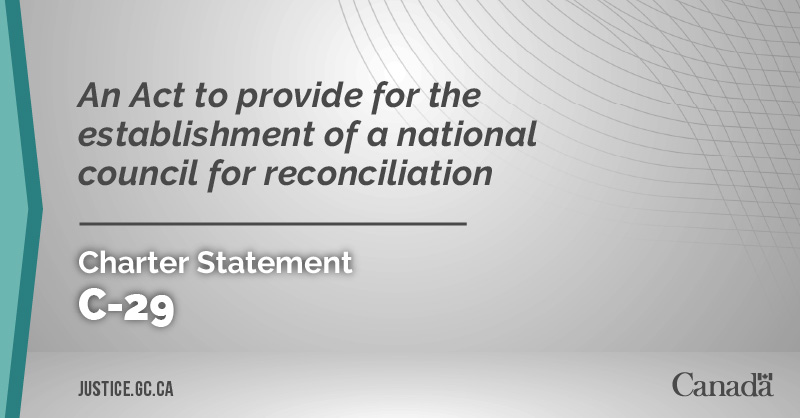Bill C-29: An Act to provide for the establishment of a national council for reconciliation

Tabled in the House of Commons, October 17, 2022
Explanatory Note
Section 4.2 of the Department of Justice Act requires the Minister of Justice to prepare a Charter Statement for every government bill to help inform public and Parliamentary debate on government bills. One of the Minister of Justice’s most important responsibilities is to examine legislation for inconsistency with the Canadian Charter of Rights and Freedoms [“the Charter”]. By tabling a Charter Statement, the Minister is sharing some of the key considerations that informed the review of a bill for inconsistency with the Charter. A Statement identifies Charter rights and freedoms that may potentially be engaged by a bill and provides a brief explanation of the nature of any engagement, in light of the measures being proposed.
A Charter Statement also identifies potential justifications for any limits a bill may impose on Charter rights and freedoms. Section 1 of the Charter provides that rights and freedoms may be subject to reasonable limits if those limits are prescribed by law and demonstrably justified in a free and democratic society. This means that Parliament may enact laws that limit Charter rights and freedoms. The Charter will be violated only where a limit is not demonstrably justifiable in a free and democratic society.
A Charter Statement is intended to provide legal information to the public and Parliament on a bill’s potential effects on rights and freedoms that are neither trivial nor too speculative. It is not intended to be a comprehensive overview of all conceivable Charter considerations. Additional considerations relevant to the constitutionality of a bill may also arise in the course of Parliamentary study and amendment of a bill. A Statement is not a legal opinion on the constitutionality of a bill.
Charter Considerations
The Minister of Justice has examined Bill C-29, An Act to provide for the establishment of a national council for reconciliation, for any inconsistency with the Charter pursuant to his obligation under section 4.1 of the Department of Justice Act. This review involved consideration of the objectives and features of the Bill.
What follows is a non-exhaustive discussion of the ways in which Bill C-29 potentially engages the rights and freedoms guaranteed by the Charter. It is presented to assist in informing the public and Parliamentary debate on the Bill. It does not include an exhaustive description of the entire bill, but rather focuses on those elements relevant for the purposes of a Charter statement.
Overview
The purpose of the Bill is to establish an Indigenous-led National Council for Reconciliation to provide oversight and monitor progress on reconciliation across Canada in all sectors, and support sustained action on long-term reconciliation. The National Council for Reconciliation's core mandate is to advance reconciliation, ensure the Government of Canada's accountability for reconciling the relationship with Indigenous Peoples and implement the Truth and Reconciliation Commission’s (“TRC”) Calls to Action. This initiative directly responds to Call to Action 53 of the TRC’s Final Report, which calls upon the Parliament of Canada, in consultation and collaboration with Aboriginal Peoples, to enact legislation to establish a National Council for Reconciliation.
The Bill would establish the Council as an independent, non-political, arm’s length, permanent institution that will monitor and report on government actions supporting reconciliation, and be a catalyst for innovative thought, dialogue and action.
The Bill would also provide that the Council issue an annual report on the state of reconciliation to be tabled in both Houses of Parliament by the Minister of Crown-Indigenous Relations. It further provides that the Government of Canada must answer the Council’s annual report on items that are under its authority by issuing an annual report outlining its plans for advancing reconciliation.
Section 15 of the Charter
Subsection 15(1) of the Charter protects equality rights. It provides that every individual is equal before and under the law and has the right to the equal protection and equal benefit of the law without discrimination, including on the basis of race or ethnic origin. Equality entails the promotion of a society in which all are secure in the knowledge that they are recognized at law as equally deserving of concern, respect, and consideration.
Establishing a body dedicated to advancing reconciliation could be considered a distinction based on race or ethnicity that engages the protection of subsection 15(1). However, in seeking to address Indigenous people’s unique experience of colonialism, racism and discrimination in Canada, the Bill is in keeping with the purpose of section 15 to promote substantive equality and prevent discrimination against disadvantaged groups. Subsection 15(2) of the Charter clarifies that subsection 15(1) does not preclude laws, programs, or activities that have as their object the amelioration of conditions of disadvantaged individuals or groups, including those that are disadvantaged because of race or ethnic origin.
Report a problem on this page
- Date modified: